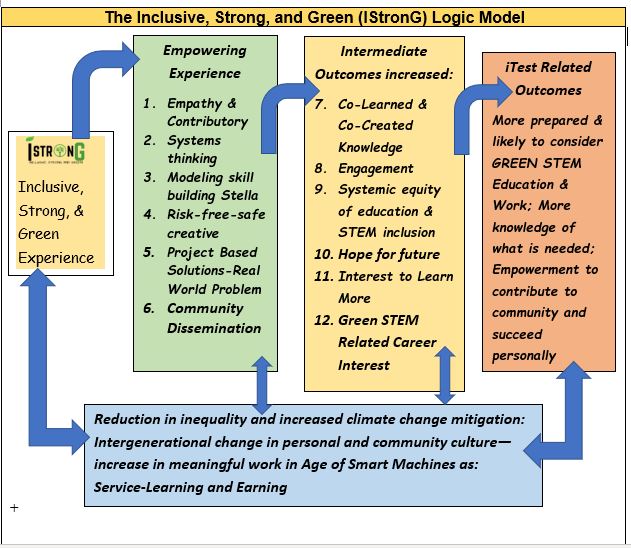iStronG is an Asset-Based, Competency-Based Curriculum
The iStronG conceptual framework is asset-based, testing the perspective that if a more (Inclusive) approach is taken in which each student is given the empowering personal experience of learning Systems Dynamics concepts and technical tools such as Stella Architect (Strong); and is also challenged to use these skills to contribute to addressing the climate crisis (Green) in their local community, that more students will be likely to believe that they can aspire to life-long learning and set meaningful goals to contribute to the world around them. Correspondingly, students with an increase in skills, and contributory goals will develop an identity that fosters their pursuing meaningful science and technology-based work.

Six Key Competencies are Fostered in iStronG
The competency-based course centers on the development of six key competencies. The five to six-week summer course curriculum culminates in the students preparing a presentation to their local community on a solutions-based project that addresses the challenge of climate solutions and reduction in carbon emissions by a certain amount. These six competencies students demonstrate in the course are:
- Understanding Systems and applying the Habits of a Systems Thinker
- Empathetic Understanding of World Climate Issues and Climate Justice concerns
- Climate System Literacy
- Introductory Stella Modeling Tool Competency
- Knowledge of Project Drawdown Climate Solutions
- Preparation of a Climate Solutions Project responding to a challenge to reduce carbon dioxide emissions in students’ local communities.

Preliminary Pilot Study Project Outcomes
UB students were asked to complete an iStronG pre-survey on the first day of the course and a iStronG post-survey at the end of the course. Despite small sample sizes, these surveys found statistically significant changes with modest effect sizes related to several iStronG and National Science Foundation (NSF) goals. Between the pre and post-tests students were significantly more likely to:
- express interest in pursuing a career related to climate and STEM sustainability studies,
- express higher levels of concern related to climate change,
- express having hope and belief in their own empowerment to address climate change,
- have an increase in their perceptions of their own knowledge of science-based solutions associated with climate change, and
- correctly interpret and provide a rationale for how CO2 levels continued to increase during the COVID pandemic despite a small drop in emissions.
Students participating in the pilot implementation were also asked a series of questions included only on the post-survey to measure their own perceptions of the impact of the course.
- 80 percent of students said they felt they had more power to address climate change; 79 percent said they were more motivated to do so.
- 82 percent said they were more knowledgeable about Green STEM.
- 79 percent said they were more knowledgeable about Green jobs.
- 57 percent indicated that they were more interested in pursuing a major in college related to Green STEM.
- 49 percent were more interested in a career in Green STEM.
- 67 percent were more interested in learning about climate science.
- 64 percent were more interested in learning about solutions for mitigating climate change.
